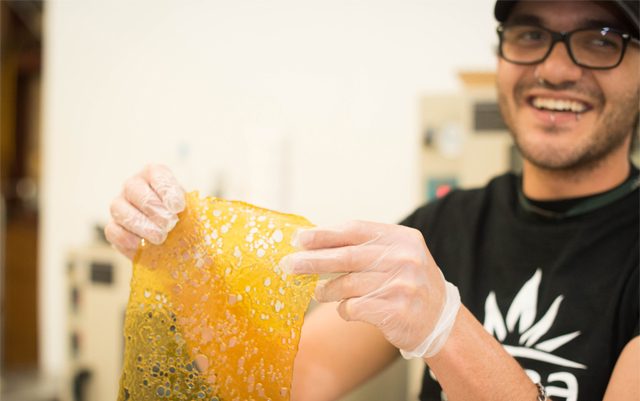To comply, or not to comply? That is the question every cannabis-infused food manufacturer is asking themselves.
The cannabis industry is in a limbo as prohibition remains the law of the land, but that hasn’t stopped some business owners to take it upon themselves to comply with federal regulations. Companies like Colorado edibles manufacturers Wana and Love’s Oven are at the top of their game and want to stay there.
Expanding operations to Oregon, Wana has licensed out their infusion process and recipes while Love’s Oven has finished with a recent expansion and pumps out nearly 10-thousand edibles a week. They are not taking the chance of being shut down or disrupted by federal food and safety regulators.
Currently, the Colorado-based companies are being treated more like a small restaurant than a large-scale food manufacturer. For example, Love’s Oven is in Denver and the city’s Department of Environmental Health (DEH) outlines marijuana foods and infused products regulations like other food businesses, using the Denver Food Establishment Regulations.
At the federal level, there’s a completely different set of criteria for an industrial sized kitchen versus a restaurant that only seats a couple dozen diners. And rightly so; a facility responsible for churning out edibles for the masses can infect thousands of consumers with bad product. When a restaurant has a health violation, it only affects the people who ate food from the establishment.
It’s a significant risk to customer loyalty, health, and revenue. That’s why Love’s Oven and Wana have done their due diligence to be in premature compliance with the Food and Drug Administration’s (FDA) regulations. Meanwhile, there are people completely unaware of the FDA requirements.
When Love’s Oven CEO, Peggy Moore sees a peer in the industry and food safety, “I tell them what it means to be FDA compliant because there’s a risk – if the federal government reschedules – that the doors will open for the FDA to look at facilities, and they’ll be blindsided.”
It affects a lot of legal cannabis businesses in the industry. According to the DEH of Denver, hash oils that are not specifically labeled for smoking or vaping only are also regulated as food products and must either be stored refrigerated or evaluated by DEH and approved for unrefrigerated storage.
RELATED ARTICLE: As Pesticide Regulations Loom Over Colorado, Wana Cannabis Infused Edibles Company Expands Manufacturing to Nevada and Oregon
Wana believes it’s their duty to raise the bar when it comes to food standards in the edibles space. They have a full-time Director of Operations to implement the standards that are not yet required in the cannabis industry. Wana believes in their values, “not just our recipes, but how to design and move product. It’s the complete package of how business should operate and will weed out people who don’t want to comply with it,” said co-founder Nancy Whiteman.
Ms. Whiteman doesn’t agree, however, with her state’s’ zero-tolerance policies on pesticide residue. Since early 2015, makers and sellers of infused products have been walking on eggshells – waiting for a call that could mean millions of dollars worth of product be discarded.
For many manufacturers in cannabis, it’s a question of reliable testing from other places in the chain of custody. The ‘drift’, or contaminated soil from nearby farms that could be transferred to soil used in cannabis cultivation, is a major concern. What could pass after a rinse for other veggies wouldn’t be up to snuff in the marijuana world. That’s because you can’t wash the flower, which will ultimately make it test positive for pesticides. After that happens, the plant and everything made from that plant is destroyed.
The Denver cultivation business, Wash Park Boutique LLC, is the most recent company affected by the strict regulations. They voluntarily recalled their contaminated product in June. Authorities report no instances of illness from the case while noting that the possible health impact of consuming marijuana products with unapproved pesticide residues is ‘unknown’.
No one at Love’s Oven originally had any big manufacturing and food safety background. So they decided to dedicate a full-time employee to bring them to compliance and voluntarily came up to standards as of May. It took about a year and the employee continues his job of ensuring they remain in compliance with daily walk-throughs and reeducation.
Moore says it’s not one and done, it’s about having to keep up with the trends, especially the FDA’s updated mandates.
The standards are found under the Food Modernization Act (FSMA), which was passed by President Obama in 2011 for the Food and Drug Administration (FDA). The sweeping reforms aim to “ensure the U.S. food supply is safe by shifting the focus from responding to contamination to preventing it,” according to the FDA website. These new FDA regulations take effect on small businesses in two years, other businesses have one year to comply.
If these businesses were suddenly overseen by the FDA, they would have some huge issues. Potentially business-ending problems, such as halting production until they fix problems pointed out by FDA inspectors.
If cannabis food manufacturers work on compliance now, they can continue doing business as usual during the upgrades. It’s also mitigates the threat of having to recall non-FDA compliant marijuana-infused edibles, if marijuana is rescheduled by the Obama administration.






